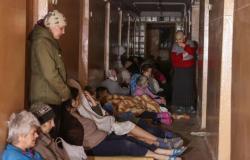Pharmacist Stanislav Havlíček spent a month as a member of the humanitarian organization Doctors Without Borders in the Gaza Strip. In the second part of the interview for Seznam Zprávy, he describes how difficult it is to give patients adequate treatment when there simply aren’t enough medicines.
“So that we didn’t run out of common medicines, such as paracetamol or ibuprofen, we only gave the patients a minimum amount. For example, a patient came down with the flu and was given five tablets, which he had for one or two days. Then he had to come again. When he didn’t recover, he got another one,” recounts Havlíček.
Over two million people in the Gaza Strip have been living without basic necessities, including food and medicine, for half a year. “The shipments we received were mostly open and incomplete. In fact, almost every box I received was damaged or incomplete in some way,” describes a pharmacist who worked in the humanitarian zone in the coastal area of Al-Mawasi near Rafah near the border with Egypt.
The cause of the desperate situation is the Israeli invasion of the region, which was launched in response to a terrorist attack by the Palestinian movement Hamas against Israeli civilians, in which about 1,200 people died. On the Palestinian side, over 30,000 have died as a result of the war, according to the Hamas-controlled authorities there. Even Israel does not dispute the total number of dead.
In connection with the health crisis in the Gaza Strip, there is talk of a shortage of medicines, including those for pain, which are necessary for the performance of operations or to relieve, for example, labor pains. How were medicines supplied to your clinics?
We didn’t have enough of anything. When I arrived, for example, there was an acute shortage of sterile scalpels. But then we managed to solve it.
So that we did not run out of common medicines, such as paracetamol or ibuprofen, we only gave the patients a minimum amount. For example, a patient came down with the flu and was given five tablets, which he had for one or two days. Then he had to come again. When he didn’t heal, he got another one.
The first part of the interview
“From previous missions, I already knew what it was like to see injured people or malnourished children’s bodies,” said Stanislav Havlíček in the first part of the interview, saying that he was overwhelmed by images of children undergoing psychological therapy in Gaza.
We had a relatively decent amount of basic antibiotics, but they could not be used for everyone, because there is a lot of antibiotic resistance in Gaza. Basic antibiotics in humanitarian kits thus largely did not work.
For suturing, we used local anesthesia for acute pain, but for standard treatment, patients only received paracetamol or ibuprofen to a limited extent.
But it could have been different elsewhere. We had it easier as primary care. In hospitals, from what I heard, the situation was worse.
What type of medicine did you miss the most?
Anti-vomiting ones for postpartum care women. Also syrup for constipation. Although the food crisis is at its peak in Gaza and many people are hungry, but because they eat what they eat and drink little water, our patients very often suffer from constipation.
There were two extremes – people here struggle with persistent infectious diarrhea, but at the same time with constipation.
Photo: from the MSF archive.
“I worked as a pharmacist and pharmacy manager. We supplied two clinics where primarily primary care was dealt with – examination by general practitioners, paediatrics, gynecology or minor surgery,” explains Stanislav Havlíček for SZ.
World media have also been reporting for months the fate of premature babies whose lives are at risk because incubators do not have enough electricity, as well as the growing number of children suffering from malnutrition. How was your experience?
In our postpartum care department, I mostly met healthy babies. Their mothers lay there with difficulty.
However, the data speak for the situation of newborns. We had 26 beds in our department. We treated 300 women there per week, which did not meet the needs. Often, some women were released within hours, even though they should normally have been hospitalized for several days.
In addition, there are only two maternity hospitals operating in the entire territory, and 300 children are born in them every day. This is a huge burden on operations and, above all, the accompanying services, which are often rarely mentioned, but which are crucial for hospitals.
Nevertheless, our women were among the happier ones. Many others give birth in tents, in insufficient hygienic conditions or without light. Some women also give birth in public buildings or schools. That’s the reality.
Logistics

The international community blames Israel for blocking the flow of humanitarian aid to Gaza. The Jewish state, on the other hand, says that humanitarian organizations and international agencies help ineffectively. How was your experience?
I am unable to say who is blocking the flow of aid. However, every truck must be unloaded at the Rafáh border crossing. None can pass directly. Only when they are loaded onto trucks for Gaza do they move on. Typically they head to UN storage facilities and then to us.
The shipments we received were mostly open and incomplete. In fact, almost every crate I received was damaged or incomplete in some way.
I personally received the remainder of the fourth shipment on site, which arrived about two weeks late. The next one was supposed to come at the end of March, but it was already clear then that it would be delayed. Waiting for material is therefore always accompanied by a certain amount of stress.
I also remember that when I was coming to Gaza, we passed convoys of humanitarian aid several kilometers long.
Tags: Czech pharmacist spent month Gaza describes healthcare works
-







